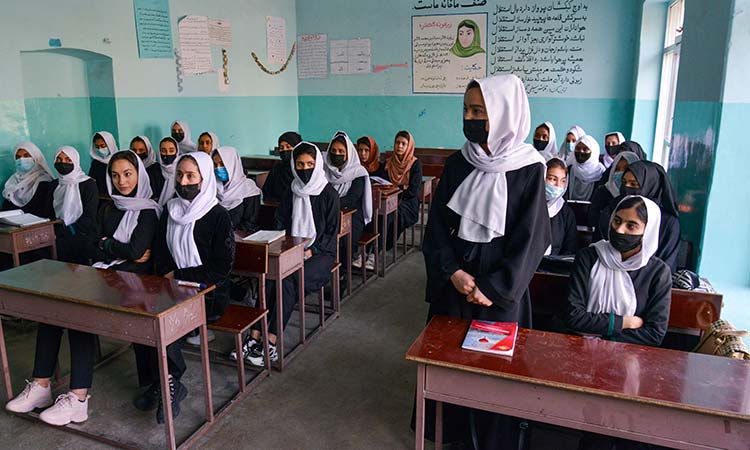ISLAMABAD — The United Nations secretary-general Antonio Guterres has now renewed his demand for Afghanistan’s Taliban to allow teenage girls to go to school again after two years on Monday.
“This is an unjustifiable violation of human rights that inflicts long-lasting damage on the entire country,” Antonio Guterres said on X (formerly known as Twitter). “Girls belong in school. Let them back in,” he added to the post.
The Worldwide Education Fund of the United Nations, Education Cannot Wait, condemned the prohibition as a violation of all human rights.
“In all, 80% of school-aged Afghan girls are currently out of school – that’s 2.5 million girls denied their right to the safety, protection, opportunity of education – their inherent human right,” the agency said.
BACKGROUND
The Taliban banned Afghan girls beyond sixth grade from going to school in August 2021. Afghanistan is the only country that has a ban on young girl’s education.
They also stopped education for girls when they ruled Afghanistan in the late 1990s.
According to AP news, “The Taliban stopped girls’ education beyond sixth grade because they said it didn’t comply with their interpretation of Islamic law, or Sharia. They didn’t stop it for boys. In the past two years, they’ve shown no signs of progress in creating the conditions they say are needed for girls to return to class.”
Hassan Abbas, an expert who writes extensively on the Taliban, says that their beliefs on girls’ education partly come from a school of 19th-century Islamic thought and rural areas where tribalism was very ingrained.
Despite the international backlash Afghanistan’s Taliban received, they went even further to ban women from public spaces like jobs, gyms, and parks (prohibiting them from visiting the Band-e Amir International Park). A close male relative must also accompany them on long road trips.
IMPACT
Antonio Guterres’ special representative, Roza Otunbayeva, said one of the most apparent impacts of the education ban is the lack of training for aspiring healthcare professionals.
Ninety-seven percent of the population needs humanitarian assistance and the female workers were forced out of their aid groups. Women are banned from getting treated and seeing male doctors under sharia law.
“A slow agonizing death for 50% of Afghan citizens,” X post says (pic.twitter.com/vbS7d2ZXZ). Referring to the suffering women, not being able to see doctors.
“Looking into the future and a scenario where nothing changes, where will the female doctors, midwives, gynecologists, or nurses come from?” Otunbayeva said in an email to The Associated Press. “In a strictly gender-segregated society, how will Afghan women be able to get the most basic healthcare services if there are no female professionals to treat them?”
Afghan female athletes are also forbidden to compete in competitions.
Several thousands of teachers lost their jobs, including the support staff. Private businesses and institutions, that profited off of schools, have also been hit according to the World Heath Organization.
Female NGO workers have been banned as well.
According to UNICEF, excluding women from the labor force costs the country’s GDP billions of dollars. People’s incomes are plummeting and the economy has gone downhill.
U.N. research has seen that birth rates are higher among 15-19-year-olds who have no secondary or higher education. Aid groups have also said that the risk of child marriage and child labor is higher now that they are not in school.
“The country has one of the highest infant mortality rates in the world and thousands of Afghan women die every year from pregnancy-related causes, a majority of which can be easily preventable,” according to UNICEF.
WILL THEY EVER CHANGE THEIR MINDS?
Sanctions, asset freezes, lack of formal recognition, and global denunciation have had little effect. They are not backing down from this idea easily
Public opinion is much more relevant and influential today than it was during Taliban rule in the 90s, said Abbas. “Internal pressure from ordinary Afghans is going to ultimately push Kandahar in the corner and make a difference.”
It can possibly take years for it to affect men while it only affects girls and women across the country.
There is still hope and desire within the country that the Taliban will do what is right for the social economy and have some sort of international acceptance.










